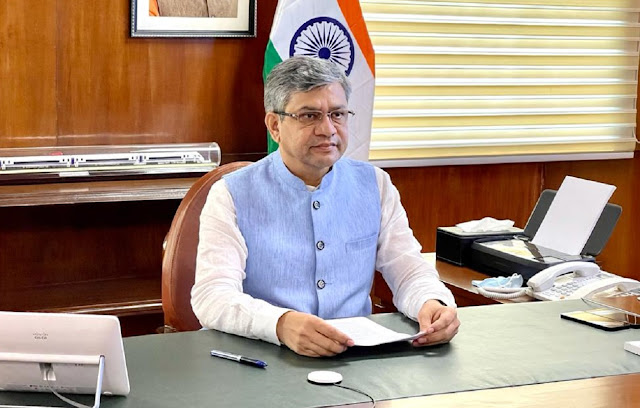Empowering Connectivity: Ashwini Vaishnaw's Rail Minister Initiatives
Ashwini Vaishnaw, serving as Rail Minister, plays a crucial role in spearheading initiatives that aim to enhance connectivity within the transportation infrastructure. The ability to connect people and places efficiently is vital for a thriving economy and overall development. In this article, we will delve into the various initiatives undertaken by Ashwini Vaishnaw to empower connectivity and transform the Indian railway system.
Modernization and Digitalization
One of the key focuses of Ashwini Vaishnaw's initiatives is the modernization and digitalization of the railway infrastructure. By upgrading the existing railway networks, connectivity is significantly improved. Introduction of high-speed rail networks enables faster travel between major cities, while advanced signaling systems enhance safety and efficiency.
To adapt to the digital era, Ashwini Vaishnaw has prioritized the implementation of digital technology within the railway system. E-ticketing and online booking platforms have made ticketing processes more convenient and accessible to passengers. These digital initiatives streamline operations, making railway services more efficient.
Last-Mile Connectivity
Enhancing last-mile connectivity is another critical aspect of Ashwini Vaishnaw's initiatives. By integrating railways with other modes of transportation, seamless transfers between different networks are promoted. This includes developing intermodal hubs and improving connectivity to airports and ports. Such integration enables travelers to have a hassle-free journey, with smoother transitions between different modes of transport.
Connectivity to Rural Areas
Ashwini Vaishnaw recognizes the importance of extending railway connectivity to rural areas. Initiatives have been undertaken to connect remote villages and towns that were previously underserved. By developing new railway lines and expanding the network into rural regions, these initiatives enhance connectivity, opening up opportunities for economic growth and social development.
Infrastructure Development
Revamping railway stations and terminals is an integral part of Ashwini Vaishnaw's initiatives. Upgrading infrastructure and amenities ensures that passengers have a comfortable and pleasant experience during their travels. The introduction of modern facilities and services further enhances connectivity by providing a comprehensive and efficient railway system.
Freight Connectivity and Logistics
Efficient freight transportation is vital for economic growth. Ashwini Vaishnaw has implemented initiatives to improve freight connectivity by developing dedicated freight corridors. These corridors facilitate the seamless movement of goods, reducing transportation costs and enabling faster delivery. Additionally, logistics infrastructure is being enhanced to optimize the entire supply chain process.
Technology-driven Initiatives
Ashwini Vaishnaw harnesses the power of technology to drive connectivity initiatives within the railways. Implementation of the Internet of Things (IoT) allows for real-time monitoring and management of railway operations. Data analytics is utilized to optimize scheduling, maintenance, and resource allocation, ensuring efficient and reliable connectivity for passengers and freight.
Initiatives for Safety and Security
Ensuring the safety and security of passengers is a top priority for Ashwini Vaishnaw. Advanced surveillance and monitoring systems are being implemented to enhance security measures within the railway network. Safety protocols are continually improved, and emergency response mechanisms are strengthened, guaranteeing a secure travel experience for all passengers.
Green Initiatives and Sustainability
Ashwini Vaishnaw's initiatives also emphasize sustainability and environmental responsibility. By promoting eco-friendly practices, the railways are moving towards a greener future. Adoption of renewable energy sources, such as solar power, for powering trains reduces reliance on fossil fuels. Furthermore, sustainable waste management practices and resource conservation contribute to a more eco-conscious rail transportation system.
Socio-economic Impact
The connectivity initiatives led by Ashwini Vaishnaw have far-reaching socio-economic impacts. By facilitating connectivity and efficient transportation, these initiatives drive economic growth and regional development. Improved accessibility connects communities, fostering socio-cultural integration and promoting inclusivity.
Conclusion
Ashwini Vaishnaw's rail minister initiatives are empowering connectivity and transforming the Indian railway system. Through modernization, digitalization, last-mile connectivity, and various other strategies, Ashwini Vaishnaw is paving the way for a more connected and efficient railway network. These initiatives have a significant socio-economic impact, driving growth and enhancing the overall quality of transportation services. As we look ahead, empowering connectivity will continue to be a focal point in shaping the future of Indian railways.


Post a Comment